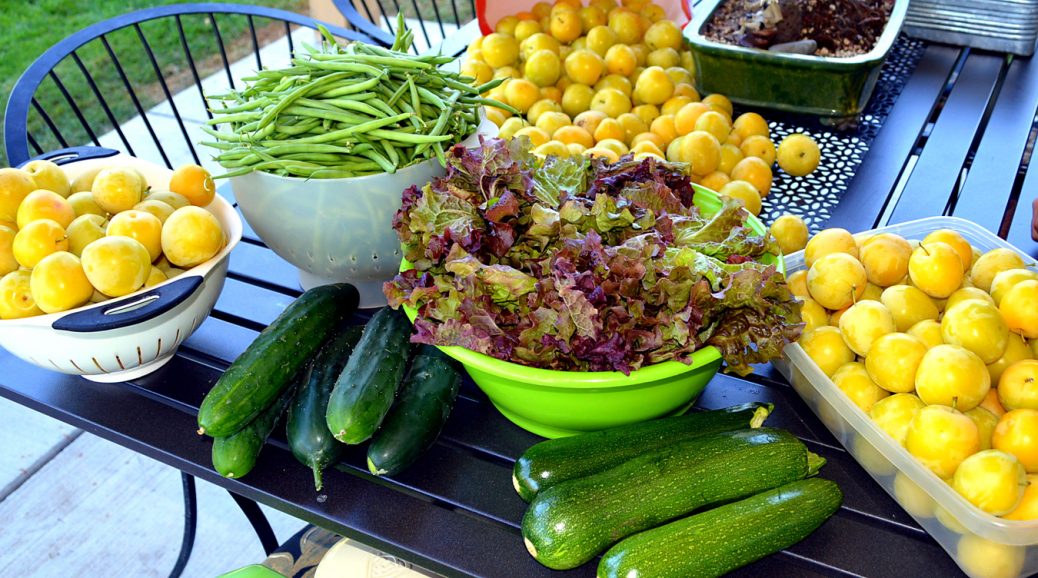By Melissa Souza
Sometimes when I drive into town I look around and think to myself, “One day this could all be different.” There have been countless zombie apocalypse, EMP blackout, and alien invasion television shows, but it’s doubtful that something like that would really happen. But what if it did? It’s difficult to imagine our familiar world with our convenient lives halted and radically altered. It seems like it could never happen, and the majority of folks live their lives telling themselves that it never will.
Then there are the “preppers,” the ones who prepare for everything and live like tomorrow will be the day that the lights go out. I have prepper friends, and sometimes I think these folks are a little crazy. And if I find them a little crazy, then society must find them out-of-this-world nuts!
So do we all start burying underground railroad cars, and stocking them with toilet paper and canned food? Do we devote our weekends to bug-out dry runs with our kids, and start wrapping up all electronics in layers of tin foil? Prepping is expensive and addicting, and can you really be prepared for everything?
I decided for my own family that I wanted to take a more practical approach to preparing. I don’t call it prepping, I prefer to look at it as living a sustainable, yet useful life.
Gardening
I don’t want to store food that I don’t eat and may never eat. My family has learned to grow our own food, to preserve what we grow, and to make it last us until the next year’s food is ready. If you grow your own food, think about storing a few years of good garden seed, and learn how to save seeds to plant the following year in the case that the local garden center disappears.
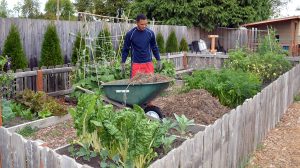
Grow a garden now, so you’ll know how when you really need to.
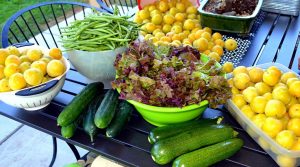
Harvest from our garden will be eaten fresh, canned, or dehydrated. Nothing goes to waste.
Storage food
Don’t get me wrong, you need to have storage food, because what if a massive earthquake, an EMP, or the little green guys take over in December? Garden seed is not going to sustain you in the dead of winter, nor will it help you for months to come. Make sure to preserve what you grow, and preserve as much as you can. If you do not grow a garden, you will need to purchase food.
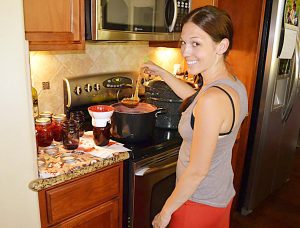
We can as much as we are able for long-term storage.
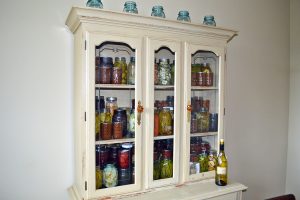
We store canned goods for when we need them.
Don’t depend on freezing everything, because no power means no freezer. Have at least three months of dry food that you rotate and actually use throughout the year. Dry rice, bean soup, and quick oats are among the most cost-efficient long-term foods you can store. If you plan to store them long-term, I recommend using food-grade pails lined with mylar bags and heat-sealed with oxygen absorbers. Think about seasoning, sugar, salt, and even hard candy. A major disaster doesn’t have to taste bad.
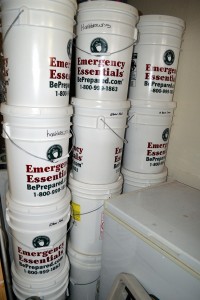
For the things you can’t grow yourself, consider investing in some stored survival food.
Water
The most important thing you will need is clean water. There will be some water stored in your hot water tank, but that will not last you long. On average, each member of your family will need one gallon of clean water to drink and cook with per day. Those 55-gallon water barrels are a great way to store large amounts of easily-accessible water. You can build a simple water barrel tower to store more in a smaller space. Another option for those who do not have a large amount of space for water storage is a high quality water filter. Keep in mind, you will need an additional water source for a filter to be an option.
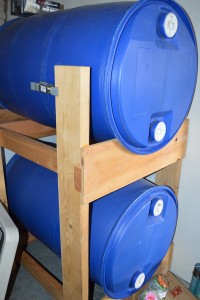
Having clean water stored is vital in an emergency.
Heat
The next thing to consider when making a preparation plan is heat. I have heard people say that they plan to just stock up on blankets and snuggle, but in the heart of winter when you actually have to survive, snuggling (although lovely) may not be your best line of defense. Think about investing in a good generator to run the heat in your home, but if an EMP takes down the grid and fries most things that are wired, that generator may be rendered useless. However, there is a greater chance of a storm or an earthquake than an EMP, so generators are still a practical and safe investment. Generators require fuel, but they can run your lights, your fridge, and your well.
The best form of alternate heat is a good wood-burning stove. You can heat your home, you can cook safely indoors, and you can use it now as well as in an emergency. A wood-burning stove is a wonderful investment because it provides peace of mind, requires no power to run, and you can save money every year by using wood heat. A wood stove also increases your home’s value by up to $2,000 if you were to sell it. We chose to have a new energy-efficient wood stove professionally installed, because it’s a practical preparedness item that we can use regularly. Pellet stoves are efficient and easy to use, but they require stored up pellets and electricity to run. In the long run, a wood stove is a better investment.
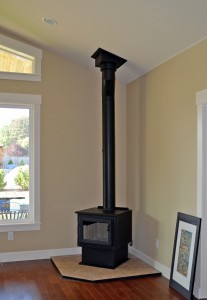
A wood-burning stove is a great investment.
Practice living without electricity
Something that your kids will think is fun to do is some dry runs with manual items. When I have time, I use my hand mill for making sauces, even though I have a perfectly good food processor that would get the job done three times as quick. Some nights we get the Dutch oven out and make a dinner over the fire. Try hanging your clothes out on a line in the summer. I do these things so that I know how. I do not want to be figuring out how to cook over a fire or on a wood stove when my food is more valuable than gold.
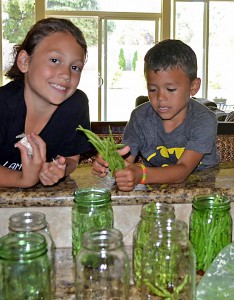
Involving your children in your preparedness plans will only make things easier if you need to use them.
Learn how to work the manual tools that you have and try to pick up some cast iron cookware, saws, and other non-electric items from garage sales or thrift stores. If you plan to bake bread, fish, or hunt for small game, now is the time to learn, not when you are running on empty and the world has gone mad. Buy a few different pails of those one-month food supplies, and take them camping with you. See what you like and don’t like, and which are the best value.
Medicine
You also need to think about medical needs and hygiene. Do you or a family member require special medication or oxygen to survive? If so, get your hands on extra. Save any medications that go unused, but be sure to watch the expiration dates on them. Have basic first-aid products on hand such as alcohol, Band-Aids, first-aid creams, burn gel, aspirin, a suture kit, eyewash, wraps, and even a basic IV kit.
Currency
The next thing to consider is currency. I say currency, not dollars, because the American dollar could become your new supply of toilet paper if things go bad. If you find that unlikely, just talk to Germans in the mid-1920s who were burning money because it was cheaper than buying wood. It is a good idea to keep some paper money out of the bank in the case of an earthquake, major storm, or financial collapse like what is occurring in Greece. Do not depend solely on the dollar, however. If you have paper money, and a major catastrophe happens, spend that before anything else, because it could quickly lose its value.
King Solomon said, “Divide your portion to seven, or even to eight, for you do not know what misfortune may occur on the earth.” Think about that and try to implement it. You could diversify into property, food, medicine, guns and ammo, paper money, precious metals, and fuel, for example. Think about investing in some physical metals. Silver is a good investment, because it’s more affordable than gold, and is preferable to barter with. You would be better off to offer someone an ounce of silver for a gallon of gas, rather than a much more valuable ounce of gold. However, in a real emergency scenario, goods could become more valuable than money, so stockpile some ammo, toiletries, and even alcohol for trading.
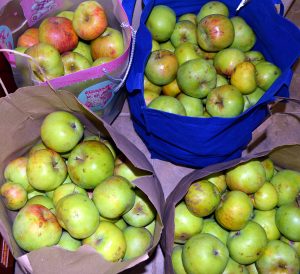
Extra produce might be good to trade during an emergency where money no longer has value.

Slowly but surely, start preparing your family by living sustainably.
Final thoughts
Don’t feel like you need to do all of these things all at once. Start slowly and think about what helps you feel prepared for what may or may not happen. Since there is a good chance that life will continue on easy street, I prefer to prepare using food, items, and lifestyle choices that we will actually use on a day-to-day basis. Figure out what works for you, and don’t share your preparations all over town. You are preparing for your family, not for the others that will come looking. Don’t be one of those families waiting on your rooftop for the government to rescue you, because if it’s a widespread disaster they may not be coming.

